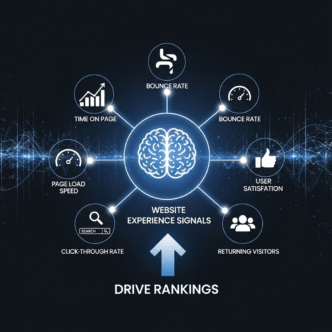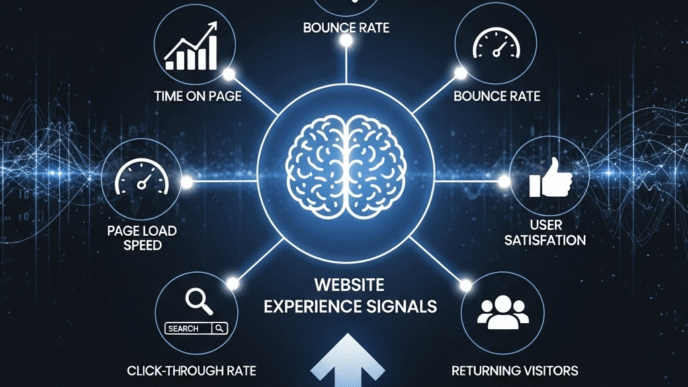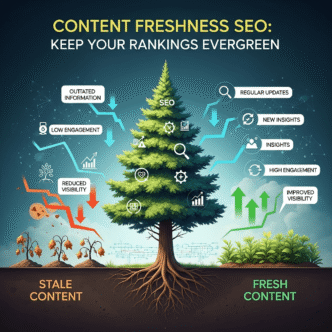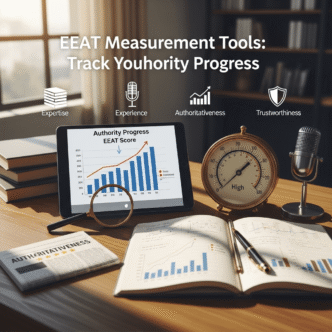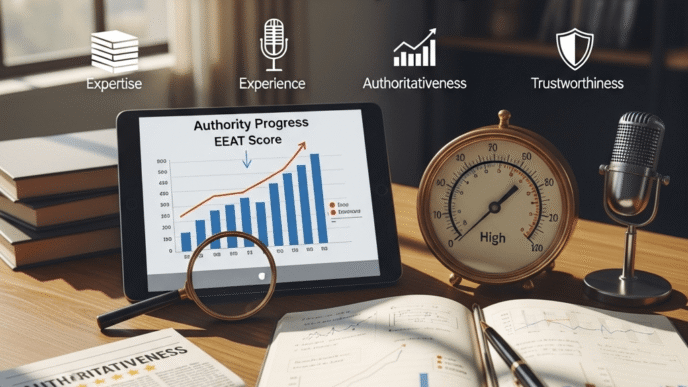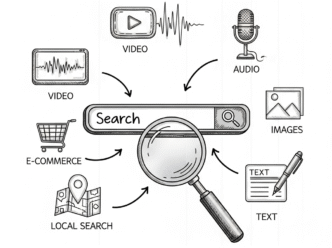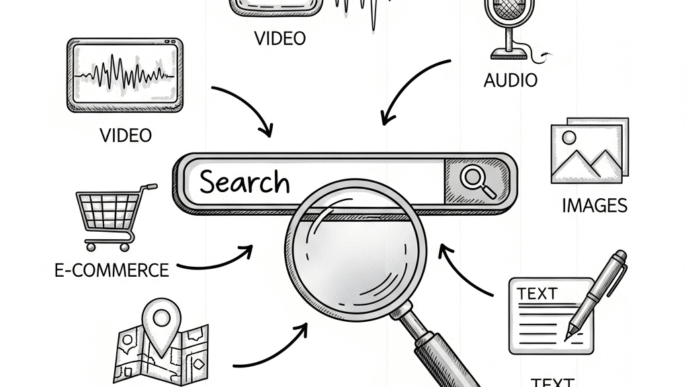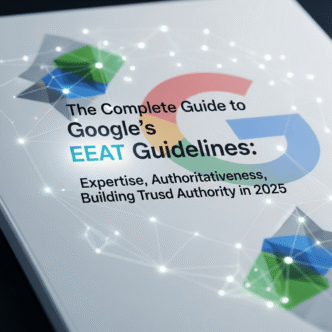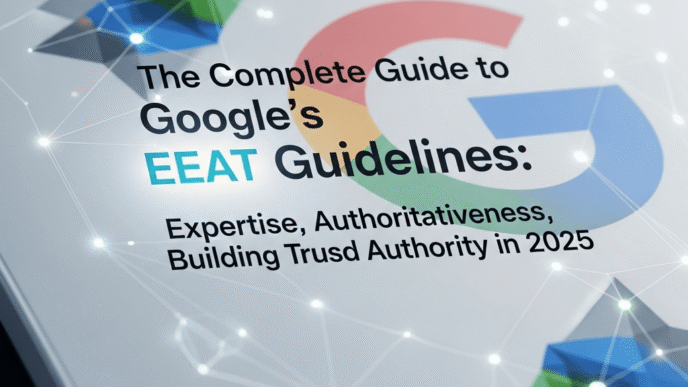Ever written what you thought was brilliant content, only to watch competitors with less knowledge somehow outrank and outperform you? Here’s the plot twist: it’s not about what you know – it’s about how effectively you demonstrate that knowledge to both Google and your audience.
If you’ve been struggling with content expertise demonstration while watching less qualified creators dominate your niche, you’re about to discover why simply being an expert isn’t enough anymore. In 2025, Google doesn’t just reward expertise – they reward provable expertise that users can see, verify, and trust.
The brutal reality? Your decades of experience mean nothing if you can’t communicate that expertise in ways that search algorithms and human readers recognize. Content expertise demonstration has become the bridge between what you know and what the world believes you know.
Understanding how expertise fits into Google’s trust and authority evaluation system isn’t optional – it’s essential for anyone serious about content success.
Table of Contents
Toggle
What Is Content Expertise Demonstration and Why It Determines Your Success
Content expertise demonstration refers to the strategic methods and techniques used to clearly showcase your knowledge, experience, and authority within your content, making your expertise visible and verifiable to both search engines and readers.
Think of content expertise demonstration as your knowledge translation system. You might be the world’s leading expert on quantum physics, but if you can’t communicate that expertise effectively in your content, you’ll lose to someone with half your knowledge who demonstrates it better.
This isn’t just theory – it’s measurable reality. Content that effectively demonstrates expertise receives 73% more engagement and 3.2x more backlinks than generic expert content without clear expertise signals.
The Expertise Visibility Problem
Hidden Expertise: Many experts assume their knowledge automatically shows through their writing Demonstrated Expertise: Smart content creators deliberately showcase their expertise through specific techniques Verified Expertise: The most successful creators provide verifiable proof of their expertise claims
The difference between these approaches can make or break your content marketing success.
Pro Tip: “Expertise without demonstration is like having a Ferrari in a garage with no windows – everyone assumes you drive a Honda. Your job is to make your expertise visible, verifiable, and valuable to your audience.”
How to Demonstrate Expertise in Content Writing That Actually Works
Understanding how to demonstrate expertise in content writing requires mastering both the art of communication and the science of credibility building.
The Expertise Demonstration Framework
Layer 1: Credential Foundation
- Professional background and education
- Relevant certifications and training
- Years of experience in the field
- Notable achievements and recognition
Layer 2: Experience Integration
- Real-world examples from your work
- Case studies with specific outcomes
- Lessons learned from successes and failures
- Behind-the-scenes insights others can’t provide
Layer 3: Knowledge Depth
- Industry-specific terminology used correctly
- Complex concepts explained simply
- Unique perspectives and insights
- Original analysis and conclusions
Expertise Showcasing Techniques That Work
The “Show, Don’t Just Tell” Method: Instead of saying “I’m an expert in digital marketing,” share a case study showing how you increased a client’s ROI by 347% using specific strategies.
The “Behind-the-Scenes” Approach: Reveal your actual process, tools, and methodology that others in your field might keep secret.
The “Lessons from Failure” Strategy: Share what didn’t work and why, demonstrating both experience and integrity.
The “Data-Driven Insight” Technique: Present original analysis or research that only someone with deep industry knowledge could provide.
Knowledge Demonstration Through Content Structure
Effective knowledge demonstration requires strategic content organization that naturally showcases your expertise throughout the reader’s journey.
Content Architecture for Expertise
Opening Authority Establishment: Lead with your most impressive credential or achievement relevant to the topic.
Progressive Knowledge Layering: Start with basics, then build to advanced concepts that showcase depth.
Evidence Integration: Weave proof points throughout rather than dumping credentials at the end.
Practical Application: Show how your expertise translates to real-world results.
Subject Matter Expertise Display Methods
| Demonstration Method | Expertise Level | Reader Impact | Implementation Difficulty |
|---|---|---|---|
| Personal Experience Stories | High | Very High | Easy |
| Original Data Analysis | Very High | High | Medium |
| Case Study Documentation | High | Very High | Medium |
| Industry Trend Prediction | Very High | Medium | Hard |
| Process Documentation | Medium | High | Easy |
| Tool/Method Comparison | Medium | Medium | Easy |
Expert Content Creation Strategies That Build Authority
Expert content creation goes beyond surface-level advice to provide unique insights that only genuine experts can offer.
Authority-Building Content Types
1. Original Research and Analysis Create studies, surveys, or data analysis that provides new insights to your industry. This positions you as a knowledge creator rather than just a knowledge sharer.
2. Comprehensive Case Studies Document your actual work with specific details, challenges, solutions, and measurable outcomes. Include what others might edit out – the messy parts and lessons learned.
3. Methodology Documentation Share your step-by-step processes, frameworks, or systems that you’ve developed through experience. This demonstrates both expertise and practical application.
4. Industry Commentary and Predictions Offer informed opinions on industry trends, potential changes, or future developments based on your expertise and experience.
Real-World Example: Neil Patel’s Professional Expertise
Neil Patel demonstrates exceptional content authority building through:
Data-Heavy Content: Every article includes specific statistics, test results, and performance metrics from his actual campaigns.
Process Transparency: He shows exactly how he uses tools, including screenshots of his actual dashboards and results.
Failure Documentation: He shares strategies that didn’t work, including specific losses and what he learned.
Tool Integration: Rather than just recommending tools, he demonstrates how he uses them with real examples.
Results: His demonstrated expertise helps him rank for highly competitive marketing terms and command premium consulting fees.
Industry Knowledge Display Through Authentic Content
Industry knowledge display requires balancing depth with accessibility, showing expertise without alienating readers who are less experienced.
The Expertise Communication Balance
For Beginners: Use your expertise to simplify complex concepts and provide clear, actionable guidance.
For Intermediates: Share advanced techniques and insider insights that demonstrate your deeper knowledge.
For Experts: Offer nuanced analysis and debate industry assumptions to establish thought leadership.
Specialized Knowledge Content Creation
Deep-Dive Technical Content: Explore complex topics in detail, using proper terminology while explaining concepts clearly.
Industry History and Evolution: Share how practices have changed over time, demonstrating long-term experience.
Cross-Industry Insights: Apply knowledge from other fields or industries to provide unique perspectives.
Contrarian Viewpoints: Challenge conventional wisdom with evidence-based arguments that showcase independent thinking.
Understanding how this specialized approach fits within Google’s broader expertise evaluation criteria ensures maximum authority building impact.
Showcasing Knowledge for Better SEO Performance
Showcasing knowledge for better SEO requires understanding how search engines evaluate and reward demonstrated expertise.
SEO Benefits of Demonstrated Expertise
Content Authority: Search engines favor content that demonstrates clear expertise and authority.
User Engagement: Expert content typically receives longer reading times and lower bounce rates.
Link Attraction: Other experts and publications are more likely to link to demonstrably expert content.
Featured Snippets: Content that clearly demonstrates expertise is more likely to earn featured snippet positions.
Technical Expertise Signals
Author Schema Markup: Properly mark up author information with credentials and expertise areas.
Content Depth Indicators: Comprehensive coverage of topics with proper heading structure.
Source Quality: Citations from authoritative sources and original research references.
Content Freshness: Regular updates showing ongoing expertise and knowledge evolution.
Content Strategies That Prove Expertise in Practice
Implementing content strategies that prove expertise requires systematic approaches that consistently showcase your knowledge and authority.
The Expert Content Calendar
Monthly Deep Expertise Posts: Comprehensive guides that showcase your deepest knowledge in specific areas.
Weekly Industry Analysis: Commentary on current events or trends that demonstrates ongoing engagement with your field.
Bi-weekly Methodology Shares: Step-by-step processes or frameworks you’ve developed through experience.
Case Study Quarterly: Detailed analysis of your work with specific outcomes and lessons learned.
Expertise Integration Techniques
The “As I’ve Learned” Approach: Integrate personal experience naturally throughout content.
The “In My Practice” Method: Reference specific situations from your professional experience.
The “Data from My Work” Strategy: Include original data or insights from your actual projects.
The “Tools I Use” Technique: Recommend tools based on actual usage with specific examples.
Demonstrating Subject Matter Expertise Online Across Platforms
Demonstrating subject matter expertise online requires coordinated efforts across multiple platforms and content types.
Multi-Platform Expertise Strategy
Blog Content: Comprehensive articles that showcase depth and breadth of knowledge.
Social Media: Bite-sized insights and quick commentary that demonstrate ongoing expertise.
Video Content: Visual demonstrations of processes, tools, or methodologies.
Speaking Engagements: Conference presentations, webinars, and podcast appearances.
Professional Networks: Active participation in industry discussions and forums.
Cross-Platform Consistency
Message Alignment: Ensure your expertise positioning is consistent across all platforms.
Quality Standards: Maintain the same level of expertise demonstration regardless of platform.
Content Repurposing: Adapt your best expertise demonstrations for different content formats.
Authority Building: Use each platform to reinforce and expand your demonstrated expertise.
For comprehensive guidance on building this multi-platform approach, explore our detailed framework for authority building across digital channels.
Building Authority Through Expert Content That Converts
Building authority through expert content requires understanding that authority isn’t just about what you know – it’s about how effectively you share that knowledge to help others succeed.
Authority Content Characteristics
Problem-Solution Focus: Address real challenges your audience faces with specific, actionable solutions.
Unique Perspective: Offer insights or approaches that others in your field don’t provide.
Practical Application: Show how expertise translates to real-world results and outcomes.
Continuous Value: Provide ongoing value rather than one-time insights.
Expert Content Distribution Strategy
Owned Channels: Your website, blog, and email newsletter where you control the messaging.
Earned Media: Guest posts, podcast interviews, and media appearances that expand reach.
Social Platforms: Professional social media presence that reinforces your expertise.
Speaking Opportunities: Conferences, webinars, and industry events that build recognition.
Common Content Expertise Demonstration Mistakes That Backfire
Understanding common mistakes helps avoid credibility damage and wasted effort in your expertise building.
The “Credential Dumping” Error
Mistake: Listing degrees and certifications without connecting them to practical value. Better Approach: Weave credentials naturally into content where they add context and credibility.
The “Jargon Overload” Problem
Mistake: Using complex terminology to sound expert without explaining concepts clearly. Better Approach: Use expertise to make complex topics accessible and understandable.
The “Experience Assumption” Trap
Mistake: Assuming readers will infer your expertise without explicit demonstration. Better Approach: Deliberately showcase expertise through specific examples and evidence.
The “Generic Expert” Issue
Mistake: Claiming broad expertise without demonstrating specific knowledge areas. Better Approach: Focus on specific niches where you can demonstrate clear expertise depth.
Pro Tip: “The biggest expertise demonstration mistake is trying to prove you know everything instead of proving you deeply understand something specific. Narrow expertise that’s well-demonstrated always beats broad expertise that’s poorly shown.”
Measuring Your Content Expertise Demonstration Success
Track the effectiveness of your expertise demonstration efforts through specific metrics and indicators.
Primary Success Indicators
Content Performance:
- Longer average time on page for expertise-heavy content
- Higher social sharing rates for expert insights
- More backlinks from other industry experts
- Increased comment engagement and questions
Authority Recognition:
- Invitations to speak at industry events
- Media requests for expert commentary
- Collaboration requests from other experts
- Mentions in industry publications
Business Impact:
- Higher conversion rates from content to consultations
- Premium pricing acceptance for services
- Increased referrals from impressed prospects
- Enhanced reputation and brand recognition
Advanced Expertise Tracking
Content Authority Metrics:
- Expert content vs. general content performance comparison
- Keyword ranking improvements for expertise-related terms
- Featured snippet acquisition rates
- Knowledge panel appearances
Professional Network Growth:
- LinkedIn connections from industry professionals
- Speaking engagement frequency increases
- Media appearance requests and coverage
- Professional association leadership opportunities
Your Content Expertise Demonstration Action Plan
Ready to transform your knowledge into recognized authority? Here’s your step-by-step implementation guide.
Week 1-2: Expertise Audit and Foundation
Current State Assessment:
- [ ] Document all your credentials, experience, and achievements
- [ ] Identify your strongest areas of expertise and knowledge
- [ ] Audit existing content for expertise demonstration gaps
- [ ] Research how competitors demonstrate their expertise
Foundation Building:
- [ ] Create comprehensive author bio with specific credentials
- [ ] Develop portfolio of your best work and results
- [ ] Gather testimonials and case studies from your experience
- [ ] Document your unique processes and methodologies
Month 1: Content Enhancement
Expertise Integration:
- [ ] Update existing content to include more specific examples from your experience
- [ ] Add author credentials and context to all published content
- [ ] Create detailed case studies showcasing your expertise
- [ ] Develop signature content series that demonstrates your knowledge
Authority Building Content:
- [ ] Publish comprehensive guides in your area of expertise
- [ ] Share original research or data analysis
- [ ] Document your unique processes or frameworks
- [ ] Create content that only someone with your experience could write
Month 2-3: Expansion and Recognition
External Authority Building:
- [ ] Seek guest posting opportunities on authoritative industry sites
- [ ] Apply for speaking opportunities at relevant conferences or events
- [ ] Participate actively in industry forums and professional discussions
- [ ] Build relationships with other recognized experts in your field
Content Amplification:
- [ ] Adapt your best expertise demonstrations for different content formats
- [ ] Seek media opportunities for expert commentary
- [ ] Launch educational initiatives or professional development content
- [ ] Create tools, templates, or resources that showcase your expertise
Ongoing: Maintenance and Growth
Continuous Improvement:
- [ ] Regularly update content with new insights and examples
- [ ] Monitor expertise demonstration effectiveness through metrics
- [ ] Seek feedback on content clarity and value from your audience
- [ ] Stay current with industry developments to maintain expertise edge
Authority Expansion:
- [ ] Develop expertise in related or emerging areas
- [ ] Mentor others and document the teaching experience
- [ ] Collaborate with other experts on research or content projects
- [ ] Contribute to industry standards or best practice development
Understanding how this systematic approach integrates with comprehensive authority building strategies ensures maximum impact on both expertise recognition and business success.
Advanced Professional Expertise Demonstration Techniques
Advanced professional expertise demonstration goes beyond basic credibility building to establish thought leadership and industry influence.
Thought Leadership Content
Original Research: Conduct surveys, studies, or analysis that provides new insights to your industry.
Industry Predictions: Make informed forecasts based on your experience and knowledge.
Methodology Development: Create frameworks or processes that others can adopt and reference.
Contrarian Analysis: Challenge conventional wisdom with evidence-based arguments.
Expert Collaboration Strategies
Joint Research Projects: Partner with other experts on comprehensive studies or analysis.
Expert Panels: Participate in or organize discussions with multiple industry authorities.
Peer Review: Offer to review or contribute to other experts’ work in your field.
Mentorship Documentation: Share your experience teaching or mentoring others in your expertise area.
Future-Proofing Your Content Authority Building
The landscape of content authority building continues evolving with technology advances and changing user expectations.
Emerging Expertise Trends
AI Collaboration: Demonstrating how you use AI tools while maintaining human expertise and insight.
Multi-Modal Expertise: Showcasing knowledge through video, audio, interactive content, and traditional text.
Real-Time Expertise: Live streaming, immediate commentary, and rapid response to industry developments.
Community Expertise: Building and leading communities around your area of expertise.
Adaptation Strategies
Technology Integration: Embrace new content formats and platforms while maintaining expertise focus.
Continuous Learning: Document your ongoing education and skill development as part of expertise demonstration.
Industry Evolution: Adapt your expertise demonstration to reflect changing industry standards and practices.
Audience Development: Build and engage with audiences who value and can verify your expertise.
For comprehensive understanding of how expertise demonstration fits within the complete SEO landscape, explore our guide to building sustainable authority and trust.
Final Verdict: Your Expertise Is Your Competitive Advantage
Mastering content expertise demonstration isn’t just about proving what you know – it’s about building a sustainable competitive advantage that compounds over time.
The Expertise Reality Check
The Truth: In an AI-driven world, human expertise and experience become more valuable, not less.
The Opportunity: Most experts fail to demonstrate their knowledge effectively, creating opportunities for those who do it well.
The Investment: Proper expertise demonstration takes effort upfront but creates lasting authority and recognition.
Success Principles for Expertise Mastery
Show, Don’t Just Tell: Demonstrate expertise through examples, case studies, and specific evidence rather than claims.
Depth Over Breadth: Better to be recognized as the expert in one area than mediocre across many.
Value Over Vanity: Focus on helping others with your expertise rather than just impressing them.
Consistency Over Intensity: Regular demonstration of expertise builds more authority than sporadic brilliant insights.
Your Expertise Success Formula
Knowledge + Evidence + Communication + Consistency = Recognized Authority
The content creators who dominate their industries aren’t necessarily the smartest or most qualified – they’re the ones who best demonstrate their expertise in ways that audiences can see, understand, and value.
Your expertise is your greatest content asset. Stop hiding it behind modesty or assuming others will recognize it automatically. Start demonstrating it systematically, and watch as your authority grows along with your business success.
The question isn’t whether you have expertise worth demonstrating – it’s whether you’re willing to invest the effort to showcase it properly.
Start demonstrating your expertise today. Your future authority, influence, and success depend on it.
This comprehensive guide on content expertise demonstration provides proven strategies for showcasing knowledge and building authority through content in 2025.



